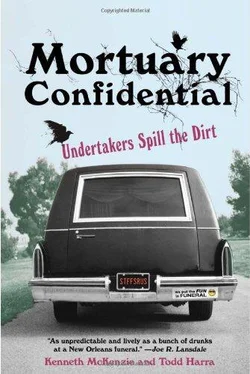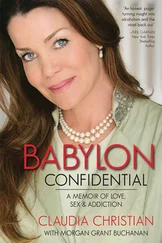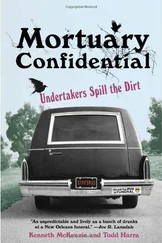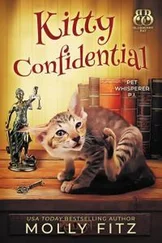In the 19th and early 20th centuries, most removals were made from the home. Some of the old-timers I work with can remember some of the old-timers they worked with who would embalm people right in their beds (by a method called gravity injection) and then make the funeral arrangements at the kitchen table with the family, usually with a bottle of spirits in the middle of the table. This was back when people were laid out in the parlors of their homes on cooling boards, and the wakes would be big social events. An old family friend, who isn’t an undertaker, likes to tell me about helping one of the local morticians in the ’40s, doing removals using wicker baskets instead of the stretchers we now use. Interestingly enough, that is rumored to be where the term “basket case” comes from. Things have changed since then. Bodies are prepared at the funeral home, and most wakes are held at the funeral home or church.
As America shifted from a predominately rural, agrarian society to an urban, industrial/technology-based nation, the sick and dying were shifted from the home to institutional care. Nowadays, most removals are made from hospitals and nursing facilities. Thanks to the emergence of the hospice program, there seems to be a rising number of home deaths. People can once again die at home, in their bed, surrounded by loved ones.
The stories in this section include house calls as well as removals from hospitals/nursing facilities—both of which, as you’ll see, can present some… interesting challenges.
CHAPTER 1
The Scream
Contributed by an amateur boxer
I’ve been in the business of death many, many years. I’ve met a lot of different people; seen a lot of deaths, many tragic; and been in too many strange situations to count, much less remember. Today I’m older and grayer, and my memory is fading a little, but there is one incident of a middle-of-the-night body removal that I will never forget as long as I’m not laying on my porcelain embalming table.
I can still picture in my mind the house where I heard a dead man scream.
I started out working for my dad’s best friend, a man I called my “uncle.” He ran a funeral home in a small city with a sprawling suburb. We serviced a fairly large geographic location and a very diverse demographic. On night calls, you never knew what end of the county you’d end up in or what type of people you’d be dealing with.
On the night of this particular event, I happened to be taking the calls with my uncle. In typical fashion, the phone rang in the wee morning hours. I fumbled for the receiver and grunted, “Hello?”
“Death call,” my uncle replied. “Meet me up at the funeral home.”
I mumbled something unintelligible and hung up. Instead of lying in bed and contemplating another five minutes of darkness, the best thing to do was just hop up—like ripping off the proverbial Band-Aid. I threw on my suit, knotted my tie, donned my topcoat, opened both eyes, and cruised up the highway to the funeral home in my beat-up Buick.
At the office, I loaded the station wagon with the supplies we would need and warmed the engine until my uncle arrived. Once he arrived, we drove a hundred yards to an all-night-diner, as was our routine, fueled up on caffeine, and set out again.
It was just a few days after the New Year, and as we drove through the suburbs, faux candles lit the way from windowsills. The occasional Christmas tree could be seen peeking from a passing house.
“Here it is,” my uncle told me, after we turned down a few quiet, tree-lined streets.
“Think so? Not too many cars,” I replied.
My uncle consulted his note. “Yep, this is it. Look at the lights.” And it was true. Every single light in the house was turned on—a sure sign of a death.
I backed the big old boat of a wagon slowly into the vacant driveway and we got out. The house was a rancher that had fallen in benign neglect; mold grew on the sides of the house and we had to push bare branches out of the way as we navigated the front walkway. My uncle knocked, and I buried my hands deep into my topcoat pockets. It had to be one of the coldest nights of the year.
“Oh, hello,” the middle-aged woman who answered the door said. “Thank you for coming this quickly so late.”
“That is what we do,” my uncle replied.
Introductions were made. Then the woman, Sue, gave my uncle the wounded expression that I had seen scores of times before, and my uncle thousands. It was the look of loss. “Come on in,” she said somberly. “Dad is in the back room.”
We trooped in, grateful to get out of the biting cold. By habit I stamped my snowless shoes on the mat as I crossed the threshold.
“This is my husband, Harold,” Sue said, and gestured to a man standing on the opposite side of the living room. He nodded at us and we both nodded back. “And that is Peaches.” Peaches was a large orange tabby sitting on the dining room table near Harold. She watched us with hooded eyes.
“Hi Peaches,” my uncle said. Having a cat of his own, he considered himself a cat person. He made a sucking sound with his mouth and Peaches’s attitude shifted. The bright ball of fur meowed and ran over to rub against his legs.
“There are more running around here,” Sue said.
My uncle smiled. I could tell he liked Sue and Harold because they were cat people.
“Dad’s back this way,” Sue said and headed towards the rear of the house.
We followed. The rooms were neither tidy nor messy; they were lived-in and had the pleasant aroma of fresh evergreen and holiday candles. Sue and her husband were old enough to have grandchildren, and the remnants of gifts for little children were strewn in our path. The three of us arrived at a bedroom at the back of the house, Harold trailing somewhere behind us. The room appeared to have been a porch at one point and we stepped down into it.
Sue’s dad lay on an old cot that looked like an iron camp bed. He was a little lump swaddled in white. Even the small bed dwarfed his tiny size. A small gold crucifix decorated a wall, but, overall, the room looked like a storeroom, which it probably was before Sue’s father moved in.
“Oh, Dad,” Sue said and she plopped next to him.
As she sat down, a bloodcurdling scream discharged from the bed. The shriek was louder than a drill sergeant’s bullhorn. It was a sound straight from hell.
My entire body went rigid and (I swear to this day) blood froze in my veins. Sue jumped up as though she’d been electrocuted and flew across the room to the safety of a corner.
I stole a wide-eyed glance at my uncle. He had seen everything in his years as an undertaker. At that moment, though, he was a shell-shocked soldier. With his mouth agape and eyes wide, he clearly wanted to run. Like me, he stayed put, scared stiff by the scream from a dead man. I am not very religious or superstitious, but standing in that room, I felt a powerful energy course through me.
Harold, behind us in the hallway, was the only one with any composure. He strode in, got down on his knees, and dragged a squalling black cat out from underneath the bed. When he let go of the cat’s scruff, it fell over, writhing and still screaming.
“Oh my gosh! Is Ridley alright?” Sue wailed. She rushed over to the cat.
“Your father is dead, tend to him,” Harold said briskly. “I’ll take care of Ridley.” With that, Harold scooped up the squalling cat and took it from the room. My uncle and I made some comments to the effect of “that poor cat,” but we were really trying to mask our feelings of terror.
We made the removal without any further surprises, and back in the station wagon, we sat in the driveway with the engine idling for a minute. “I thought—I thought—” I said, but was unable to complete the sentence.
Читать дальше












